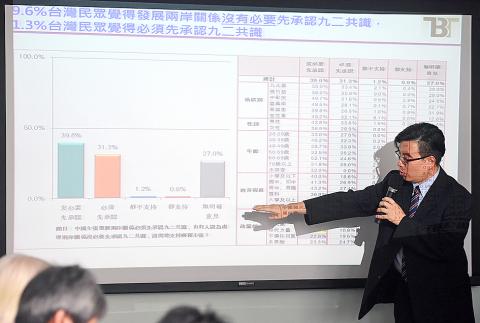An overwhelming majority of Taiwanese believe Taiwan is a sovereign and independent nation, the results of a poll released yesterday by the Taiwan Brain Trust think tank showed, with 75.8 percent of respondents supporting the sentiment, while 18.9 percent disagreed.
On the issue of Taiwan’s status as a nation, the poll showed that 79.8 percent of respondents said that it is “definitely” or “probably” a sovereign nation, while only 18.9 percent said that either it is “definitely not” or “probably not” a sovereign nation.
The answers indicated that most Taiwanese disagree with a recent statement by China’s Taiwan Affairs Office spokesperson An Fengshan (安峰山), who said that “Taiwan has never been a nation.”

Photo: Liao Chen-huei, Taipei Times
Regarding President Tsai Ing-wen’s (蔡英文) policies on cross-strait relations, the poll showed that 49.4 percent of respondents support her, while 25.5 percent do not.
However, 79.8 percent of respondents said that Taiwan should maintain the “status quo” in regard to its relationship with China.
The poll found that 39.6 percent of respondents do not think it is necessary for Taiwan to acknowledge the so-called “1992 consensus” as a prerequisite for developing relations with China, while 31.3 percent feel that recognition of the “1992 consensus” is necessary.
The “1992 consensus” — a term former Mainland Affairs Council chairman Su Chi (蘇起) admitted making up in 2000 — refers to a tacit understanding between the Chinese Nationalist Party (KMT) and the Chinese government that both sides of the Taiwan Strait acknowledge that there is “one China,” with each side having its own interpretation of what “China” means.
In response to the question of what Taiwan should do if the “status quo” cannot be maintained, 60.5 percent of respondents said they would support independence, while 22.4 percent said they would support unification with China.
The numbers showed a significant shift from last year’s 70.9 percent and 22.4 percent respectively.
A cross-analysis of the poll showed that among those respondents in favor of independence, 87.4 said they support the New Power Party (NPP), 83.1 percent the Democratic Progressive Party (DPP), 50.3 percent the People First Party (PFP) and 35.3 percent the Chinese Nationalist Party (KMT).
Among those respondents who support unification with China, 47.6 percent support the KMT, 34.3 percent the PFP, 10.5 percent the DPP and 6.5 percent the NPP.
The think tank said the telephone survey was conducted between 6:30pm and 10pm on Oct. 13 among randomly selected respondents aged 20 or older.
The think tank said it collected 1,079 valid samples, adding that the poll has a margin of error of 3 percentage points.
This was the first public opinion survey conducted by the think tank since its operations in August were handed over to the Ketagalan Foundation, an organization operated by supporters of former president Chen Shui-bian (陳水扁).

INVESTIGATION: The case is the latest instance of a DPP figure being implicated in an espionage network accused of allegedly leaking information to Chinese intelligence Democratic Progressive Party (DPP) member Ho Jen-chieh (何仁傑) was detained and held incommunicado yesterday on suspicion of spying for China during his tenure as assistant to then-minister of foreign affairs Joseph Wu (吳釗燮). The Taipei District Prosecutors’ Office said Ho was implicated during its investigation into alleged spying activities by former Presidential Office consultant Wu Shang-yu (吳尚雨). Prosecutors said there is reason to believe Ho breached the National Security Act (國家安全法) by leaking classified Ministry of Foreign Affairs information to Chinese intelligence. Following interrogation, prosecutors petitioned the Taipei District Court to detain Ho, citing concerns over potential collusion or tampering of evidence. The

Seventy percent of middle and elementary schools now conduct English classes entirely in English, the Ministry of Education said, as it encourages schools nationwide to adopt this practice Minister of Education (MOE) Cheng Ying-yao (鄭英耀) is scheduled to present a report on the government’s bilingual education policy to the Legislative Yuan’s Education and Culture Committee today. The report would outline strategies aimed at expanding access to education, reducing regional disparities and improving talent cultivation. Implementation of bilingual education policies has varied across local governments, occasionally drawing public criticism. For example, some schools have required teachers of non-English subjects to pass English proficiency

NEGOTIATIONS: The US response to the countermeasures and plans Taiwan presented has been positive, including boosting procurement and investment, the president said Taiwan is included in the first group for trade negotiations with the US, President William Lai (賴清德) said yesterday, as he seeks to shield Taiwanese exporters from a 32 percent tariff. In Washington, US Trade Representative Jamieson Greer said in an interview on Fox News on Thursday that he would speak to his Taiwanese and Israeli counterparts yesterday about tariffs after holding a long discussion with the Vietnamese earlier. US President Donald Trump on Wednesday postponed punishing levies on multiple trade partners, including Taiwan, for three months after trillions of US dollars were wiped off global markets. He has maintained a 10 percent

TRADE: The premier pledged safeguards on ‘Made in Taiwan’ labeling, anti-dumping measures and stricter export controls to strengthen its position in trade talks Products labeled “made in Taiwan” must be genuinely made in Taiwan, Premier Cho Jung-tai (卓榮泰) said yesterday, vowing to enforce strict safeguards against “origin laundering” and initiate anti-dumping investigations to prevent China dumping its products in Taiwan. Cho made the remarks in a discussion session with representatives from industries in Kaohsiung. In response to the US government’s recent announcement of “reciprocal” tariffs on its trading partners, President William Lai (賴清德) and Cho last week began a series of consultations with industry leaders nationwide to gather feedback and address concerns. Taiwanese and US officials held a videoconference on Friday evening to discuss the